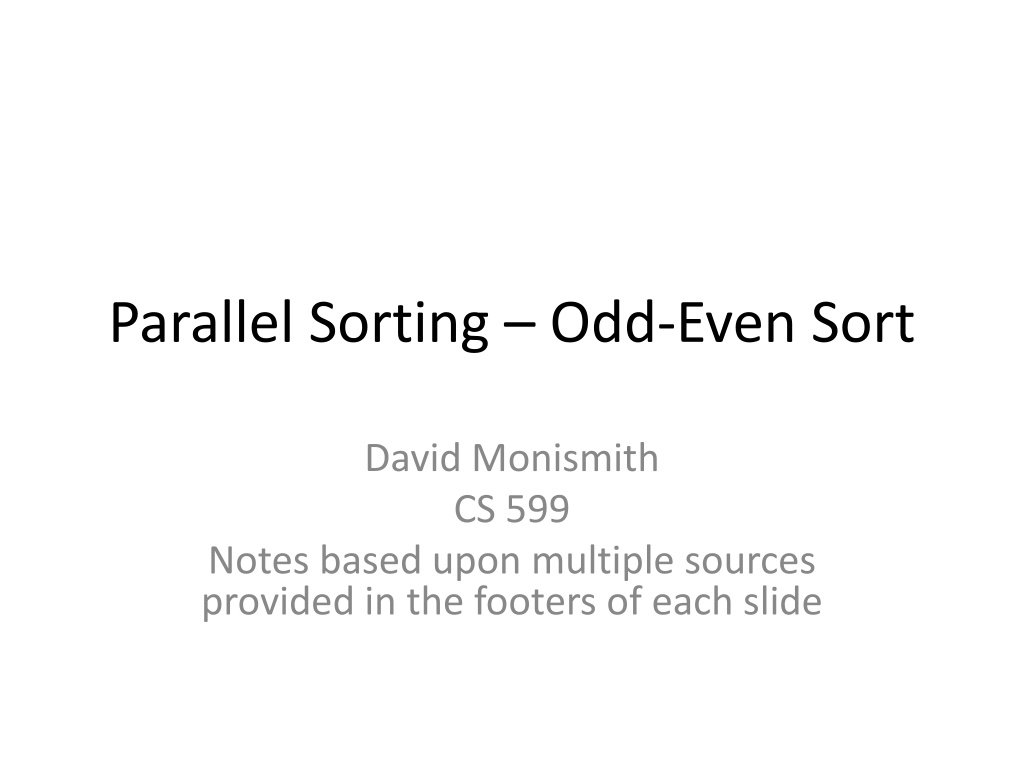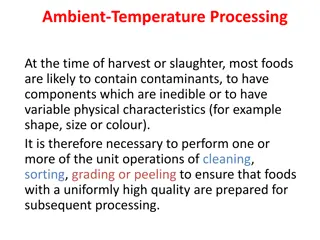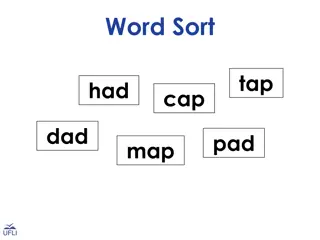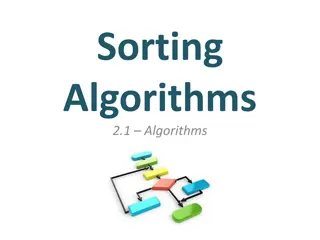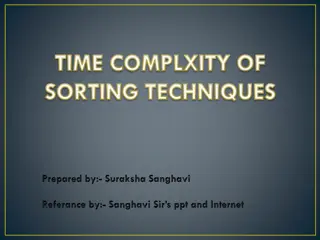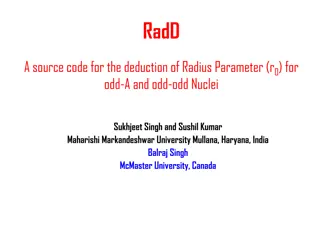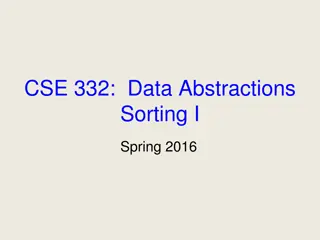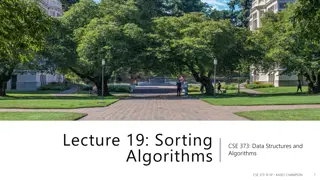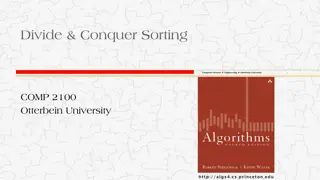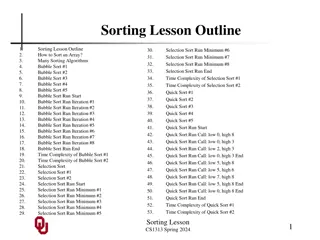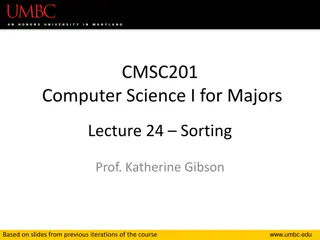Odd-Even Sorting in CS: Understanding Monismith's Notes
The notes on Odd-Even Sorting by David Monismith in CS 599 provide insights into this algorithm from various sources. Delve into the intricacies of parallel sorting, with detailed explanations on the odd-even sort method. Explore the footers of each slide for a comprehensive understanding of this sorting technique and its implementation in computer science. Enhance your knowledge and grasp the concepts elucidated in this resourceful material for a deeper insight into the world of sorting algorithms.
Download Presentation

Please find below an Image/Link to download the presentation.
The content on the website is provided AS IS for your information and personal use only. It may not be sold, licensed, or shared on other websites without obtaining consent from the author.If you encounter any issues during the download, it is possible that the publisher has removed the file from their server.
You are allowed to download the files provided on this website for personal or commercial use, subject to the condition that they are used lawfully. All files are the property of their respective owners.
The content on the website is provided AS IS for your information and personal use only. It may not be sold, licensed, or shared on other websites without obtaining consent from the author.
E N D
Presentation Transcript
Parallel Sorting Odd-Even Sort David Monismith CS 599 Notes based upon multiple sources provided in the footers of each slide
Recall Bubble Sort Bubble sort is a O(N2) sorting algorithm. It is simple to understand and implement. It has terrible performance, even when compared to other O(N2) algorithms. So why discuss it? Easy to understand Easy to implement Easy to parallelize http://en.wikipedia.org/wiki/Bubble_sort
Optimized Bubble Sort Algorithm do { int new_n = 0; for(i = 1; i < n; i++) if(arr[i-1] > arr[i]) { swap(&arr[i-1],&arr[i]); new_n = i; } n = new_n; } while(n > 0); http://en.wikipedia.org/wiki/Bubble_sort
Odd-Even Sort Parallelizable version of Bubble sort Requires N passes through the array. Each pass through the array analyzes either: Every pair of odd indexed elements and the preceding element, or Every pair of even indexed elements and the preceding element. Within each pass, elements that are not in order are swapped. Introduction to Parallel Programming 2nd Ed.
Odd Even Sort Complexity As this algorithm is a bubble sort, its work complexity is O(N2). Notice that the step complexity of the algorithm is O(N) as each inner loop may be executed in parallel. The results of each iteration of the outer loop are dependent upon the previous iteration. Notice that there are N iterations in the outer loop, and each inner loop consists of a full pass through the array, requiring O(N) operations. Introduction to Parallel Programming 2nd Ed.
Example An example of odd-even sort will be provided on the board. Students will complete a worksheet problem to trace an odd-even sort. The goal of this exercise is to see how the algorithm can be parallelized.
Odd-Even Sort Algorithm for(n = 0; n < N; n++) { if(n & 1){ for(i = 2; i < N; i+=2) if(arr[i-1] > arr[i]) swap(&arr[i-1],&arr[i]); } else { for(i = 1; i < N; i+=2) if(arr[i-1] > arr[i]) swap(&arr[i-1],&arr[i]); } } homepages.ihug.co.nz/~aurora76/Malc/Sor ting_Array.htm
OpenMP Parallelization Parallelization of the Odd-Even Sort Algorithm is straightforward as the swap operations performed within each iteration are independent. Thus each odd or even step may be fully parallelized through OpenMP directives.
Straightforward Parallelization With OpenMP for(n = 0; n < N; n++) { if(n & 1){ #pragma omp parallel for private(i) shared(arr) for(i = 2; i < N; i+=2) if(arr[i-1] > arr[i]) swap(&arr[i-1],&arr[i]); } else { #pragma omp parallel for private(i) shared(arr) for(i = 1; i < N; i+=2) if(arr[i-1] > arr[i]) swap(&arr[i-1],&arr[i]); } }
MPI Parallelization Distributed parallelization of the Odd-Even Sort Algorithm is somewhat different than the threaded (shared memory) version. Approximately equally chunks of the array to be sorted are sent to each process. Local arrays are sorted within each process. Data from the arrays is then swapped with the odd neighbor or the even neighbor. http://en.wikipedia.org/wiki/Bubble_sort
MPI Pseudocode Sort local array for(i = 0; i < num_processes; i++) { neighbor=findNeighbor(i,rank); if(neighbor >= 0 && neighbor < num_processes) Send local array to neighbor and Receive neighbor s local array if(rank < neighbor) keep smaller elements else keep larger elements endif endif endfor http://cs.nyu.edu/courses/spring14/CSCI- UA.0480-003/lecture11.pdf
Find Neighbor Pseudocode int findNeighbor(i, rank, num_processes) if(i is even) if(rank is even) neighbor = rank + 1 else neighbor = rank - 1 endif else if(rank is even) neighbor = rank - 1 else neighbor = rank + 1 endif end if if(neighbor < 0 || neighbor >= num_processes) return -1; return neighbor; http://cs.nyu.edu/courses/spring14/CSCI- UA.0480-003/lecture11.pdf
MPI Implementation //Sort local values qsort(arr, numElements, sizeof(int), compare); //Begin iterations for(n = 0; n < size; n++) { MPI_Barrier(MPI_COMM_WORLD); int neighbor = computeNeighbor(n, rank, size); if(neighbor >= 0 && neighbor < size) { //Send my values to my neighbor and receive values from my neighbor MPI_Sendrecv(arr, numElements, MPI_INT, neighbor, n, recvArr, numElements, MPI_INT, neighbor, n, MPI_COMM_WORLD, &status); //If my rank < my neighbor's rank, keep the smaller values if(rank < neighbor){ mergeArrays(arr, recvArr, temp, numElements, 1); //Else keep the larger values } else { mergeArrays(arr, recvArr, temp, numElements, 0); } } }
